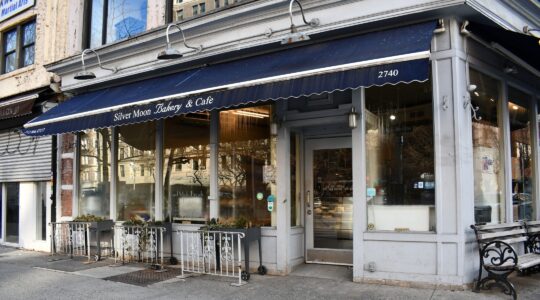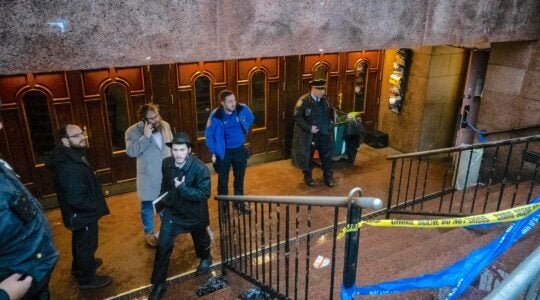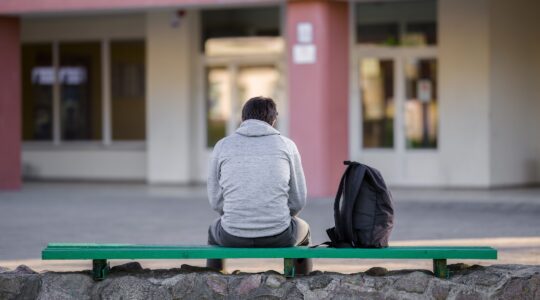It is a song heard in just about every preschool in the country. The teachers bend at the waist and sing wide-eyed: ÒIf youÕre happy and you know it clap your hands ÉÓ But the cheerful song suddenly becomes poignant, almost painful, when you realize this is a school for autistic children for whom it is a precious skill to be happy, let alone to know it and clap.
Yet here in the Shema Kolainu school for autistic children, staffers point to Shira, almost skeletal at the start of the school year, now able to select the foods she likes; Mendy, once heavily medicated to lasso his wild behavior, weaned off medication and able to sit still, ask for a toy and follow a task; and
Chaim, learning to focus and read, and who may even be mainstreamed.
Another child, who never looked into his parentsÕ eyes, learns to make eye contact.
And just when you think that autism is enough to overcome, there came the fire.
A highly publicized pre-Passover blaze destroyed a Borough Park matzah factory. The Jewish and non-Jewish communities came together beautifully to facilitate the availability of matzah for the holiday, and the bakery was up and running again within days.
But the fire on New Utrecht Avenue and 43rd Street had another less publicized victim that is still recovering: the bakeryÕs neighbor, Shema Kolainu, whose building was scheduled to open in September. Instead, Shema KolainuÕs 21 autistic students will begin the school year in four classrooms at the Boro Park Y, with the limited space keeping 50 other children on a waiting list limbo.
Josh Weinstein, who founded the nondenominational school in 1998, says he hopes at least one floor of the proposed four-story building will be available in November. That will mean space for 24 to 30 children, he says.
ÒWe hope that by January weÕll have room for 50 children. When we finish, weÕll be able to accommodate over 100 children,Ó Weinstein says.
The school uses the state-of-the-art Applied Behavioral Analysis technique to reach children whose autism and other developmental disorders places them seemingly beyond the reach of learning, even love. The ABA method measures success in minuscule increments, but is making inroads with children who were once hopelessly institutionalized.
Weinstein says Shema Kolainu (literally ÒHear Our VoicesÓ) is Òthe only Jewish school that I know of in the United States or Israel that offers ABA on a one-to-one basis.Ó Shema Kolainu also trains parents in the method.
A uniquely Jewish environment was considered imperative for children from Yiddish- or Hebrew-speaking families, where the language barrier presented yet another frustrating roadblock between therapists and children whose communication skills are already deeply impeded. Additionally, explains Weinstein, a Jewish environment helps each child integrate into home and community. The children, aged 3 to 12, play with aleph-bet puzzles and learn about the seasonal holidays.
The schoolÕs staff is clearly motivated that each child has a pure soul, and was created pure by God, however hidden that may seem by the autistic blockade.
A laminated poem on one wall explains:
ÒIf one is different, must they be called Ôslow,Õ
Because to you their accomplishments donÕt show?
The lilies will grow with their backs bent.
That is their beauty, itÕs the way they were meant.
The rose with the thorns is a favor from Hashem,
So the daffodil isnÕt ÔimpairedÕ if she doesnÕt have them …Ó
This is the only Jewish school for autism, Weinstein says, and that shapes up as a major problem for the Jewish community. Autism Ñ recognized as a neurological disease only six decades ago Ñ has become almost epidemic. According to a recent cover story in Newsweek, the number of California children receiving state services for autistic disorders Òhas nearly quadrupled since 1987, rising 15 percent in the past three months alone. Nationally, the demand for such services rose by 556 percent during the Õ90s.Ó
By some national indicators, autism has become more common than Down syndrome. The debate over numbers centers on whether the disease is actually spreading or whether educators and doctors are better learning to recognize it.
Shema Kolainu says autism occurs in 4.5 of 10,000 births, and is three times more likely to affect boys rather than girls. From birth, autistic babies are sometimes recognized by their likeliness to arch their back away from the caregiver, and are either overly passive or agitated.
About one-third of autistic children develop normally for at least a year before symptoms emerge, sometimes as late as the third birthday. The dysfunctional nature of an autistic child manifests itself in repetitive, non-goal-oriented behavior such as rocking, head banging, hand flapping or hand biting. There is often poor eating and sleeping patterns, a loss of eye contact, and insensitivity to pain and stimulus. There is an inability to maintain attention or attain basic social impulses.
At Shema Kolainu, the children attend a five-hour school day, five days a week, including summer. They are taught communication and verbal and social skills, school self-sufficiency, physical motor development and how to function in a family setting.
Even going to the bathroom or having lunch are part of the curriculum: bathroom sessions are scheduled, and some children must be taught how to eat and ask for food.
The children are loosely divided by age, but each child has a full-time therapist/teacher of his or her own. There are cubbies, puzzles on the desks and a ÒCurious GeorgeÓ book on a table. Classrooms are decorated in the traditional way: alphabet charts circle the upper rim of the walls; birthdays are marked on balloon-shaped construction paper; and there are weather charts on a wheel with a spinner. The arts and crafts give it away as a Borough Park-based school: one glue and red-crepe paper construction of a cow is labeled Òthe Para Aduma,Ó the esoteric red heifer described in the Torah.
Some children were playing on a large rubbery aleph-bet puzzle on the floor. ÒWhat comes after nun?Ó asks a teacher.
ÒSamach!Ó a girl answers.
Weinstein says, ÒWhen she came into the program she could hardly speak. Now sheÕs the class yenta! She loves music. We use music to bring her out; thatÕs her reinforcement. At Pesach she was able to learn the whole Ma Nishtana.Ó
Meanwhile, while the teachers work with the kids, work progresses on the building next to the matzah factory. Already in a few weeks the baking will begin for Passover.
For the autistic children and their parents, the school next to the bakery is a Red Sea all its own.
Shema Kolainu, the Autism Center for Children and Families, can be reached at 1955 54th St., Brooklyn, NY 11204; phone (718) 258-0130.
The New York Jewish Week brings you the stories behind the headlines, keeping you connected to Jewish life in New York. Help sustain the reporting you trust by donating today.




